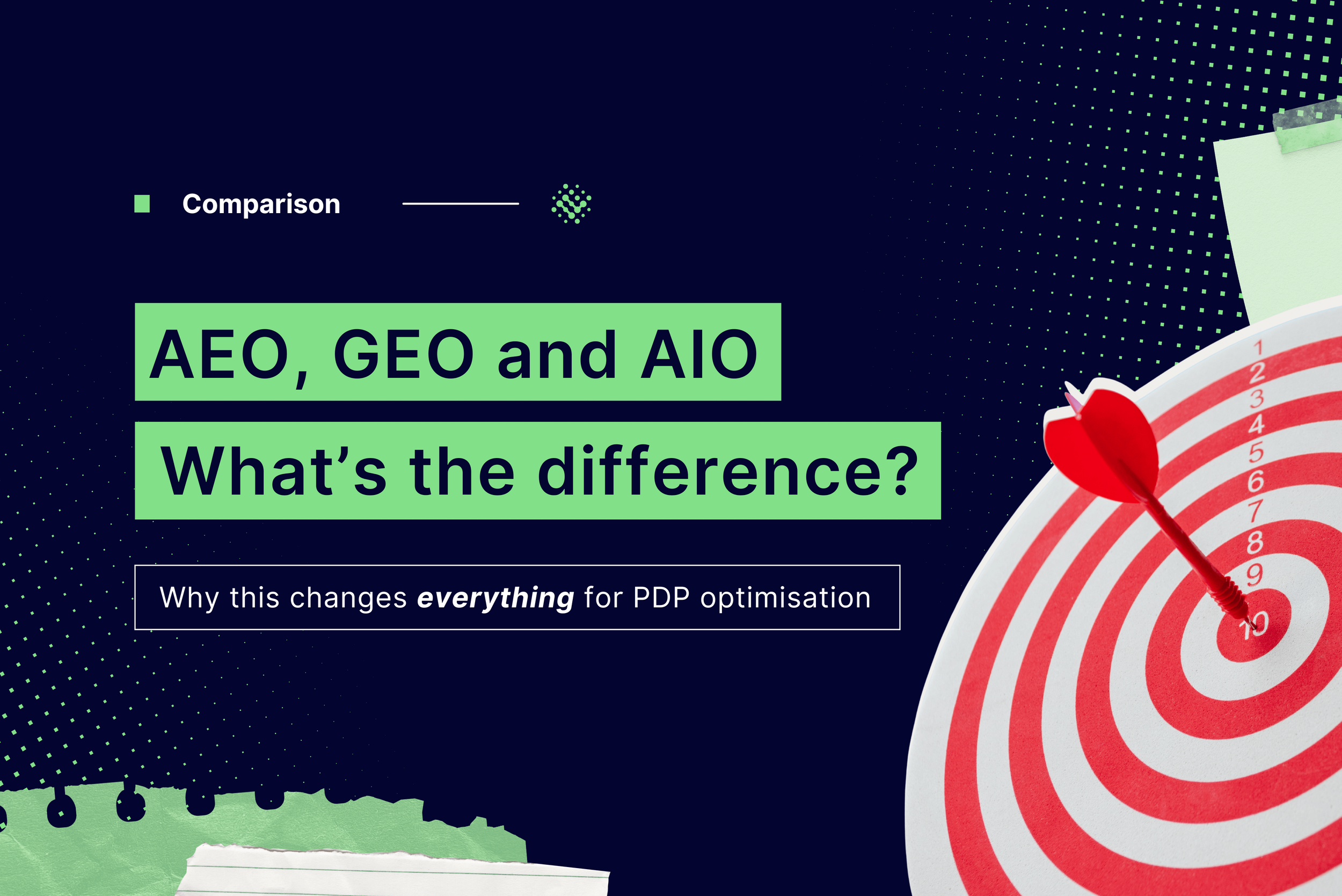How to Optimize SEO Titles for Rankings & Clicks According to Best Practice
What is an SEO Title – and how do you optimize it for SEO and AI Search? Read on to find out.
Why SEO Title Optimization Matters
SEO titles are your first impression in search. They’re what potential customers see first on Google – and they play a major role in whether your product gets clicked or ignored. Google considers the title tag one of the most important on-page elements when determining the relevance of your content to a search query.
For eCommerce brands, title optimization is even more critical. Effective titles don’t just help you rank well in organic search – they’re also essential for appearing (and performing) in Google Shopping feeds. That’s why every title must strike a careful balance between SEO best practices and compliance with Google Merchant Centre (GMC) requirements.
At Ocula, we believe every word should work harder. A well-optimised title improves discoverability, drives higher click-through rates, and ultimately helps your products convert better. In a competitive market, optimized titles should become your edge.
Title Tags vs. Product Titles (H1 Tags)
What’s the difference between Title Tags and Product Titles (also known as H1 tags)? Many businesses confuse these elements, but they serve different purposes.
What are product titles?
A product title is the product’s visible headline on a webpage. Product titles provide structure for users and can be linked to a title tag. They’re also known as H1 Tags.
Example: <h1>Sony WH-1000XM5 Wireless Noise Cancelling Headphones</h1>
What are title tags?
Title tags appear in search engine results and browser tabs. They heavily influence SEO rankings, as Google reads the title tag within a webpage’s html – which is why they’re also known as SEO titles. SEO titles are often the first signal of the page’s main topic, and are usually built by using a product title (H1 Tag).
Example: <title>Sony WH-1000XM5 Wireless Noise Cancelling Headphones – Silver</title>
Both title tags and product titles should work together to create an effective user-friendly experience. However, it’s particularly vital to understand SEO title best practices if you want your products to show up in search engines.
SEO Title Best Practices
SEO Title best practices differ based on search intent
An optimized SEO title should suit the user’s search intent. Different customer behaviours shape how people search for products, meaning a one-size-fits-all approach won’t work.
Electronics – Shoppers often search by brand and model number, making it crucial to prioritise these elements near the start of your SEO title tag.
Fashion & Apparel – Consumers may search by style, colour, or fit. Best practices is to include these attributes in a natural order within your SEO title to enhance product relevance.
Home & Kitchen – Features like size, material, and functionality should be highlighted in your SEO title, as they’re major influences on homeware buying decisions.
Beauty & Skincare – Key product benefits, ingredients, and skin type suitability are major drivers in search queries – so be sure to include them in your SEO title tag.
How to structure title tags for maximum SEO impact
Word order matters. Google interprets meaning based on how terms are arranged – for example, “milk chocolate” and “chocolate milk” aren’t the same. A well-structured title tag will help search engines match your product to a shopper’s intent as accurately as possible.
Follow these general guidelines for SEO title optimization:
Prioritise search behaviour → Structure titles based on how customers search in each category.
Start with the brand first (if well-known) → “Adidas UltraBoost Running Shoes – Black, Size 10.”
Highlight key features → Material, size, colour, and functionality should be included based on importance relative to user search behaviour for that category.
Place important keywords early → Google prioritises the first few words in a title.
Use natural language → Avoid keyword stuffing; titles should be search-friendly and compelling.
Here’s a couple of examples demonstrating optimized title tag structure by category:
Category: Electronics
Optimised Title Example: Sony WH-1000XM5 Wireless Noise Cancelling Headphones – Silver
Category: Homeware
Optimised Title Example: Ninja Blender, High-Speed (Black, 64 oz)
Category: Beauty
Optimised Title Example: The Ordinary Niacinamide 10% + Zinc 1% Serum – 30ml
Looking for an AI solution for SEO Title Tag generation?
Ocula’s AI Copywriter helps eCommerce businesses create SEO title tags at scale – automating the manual writing process and ensuring high-quality, search-friendly results.
Ocula structures each SEO title based on real-world search behaviour, prioritising the most relevant terms. Automating title generation saves time while ensuring consistency and high quality across your entire product catalogue. Whether you're updating titles directly on your eCommerce website or maintaining a product feed for Google Shopping, Ocula can generate and export SEO title tags tailored to your system. SEO optimization becomes more complex at scale because product titles vary dramatically between categories. Ocula solves this by applying tailored logic to each category, allowing businesses to maintain quality and relevance without needing to manually adapt every title format. Our AI Copywriter even takes into account your website’s structure, including how your pages and URLs handle product variants like colour and size. This ensures that SEO titles remain accurate, scalable, and aligned with your eCommerce architecture.
By handling both SEO optimization and GMC compliance, Ocula ensures SEO titles perform well in organic search and Google Shopping, increasing visibility and sales.
Final Thoughts
Your SEO title is not just a string of words. Treat it as a powerful tool to increase visibility, improve rankings, and drive sales. By balancing search intent, technical considerations, and automation, you can create compelling titles that both search engines and customers love. The sooner you start optimising, the sooner your rankings will climb!





